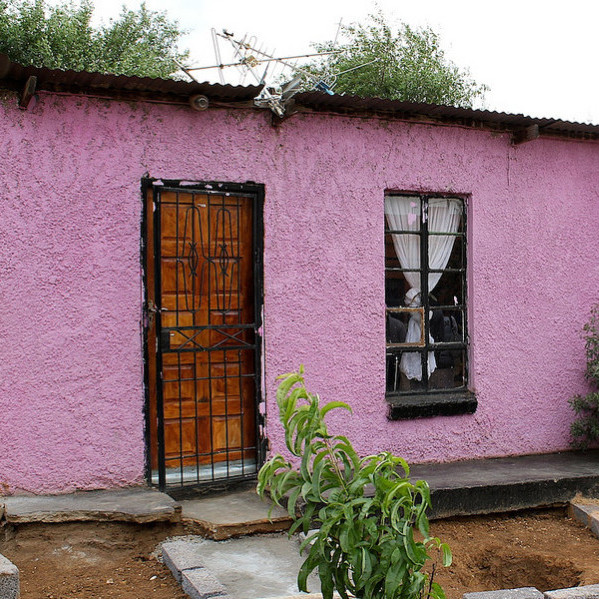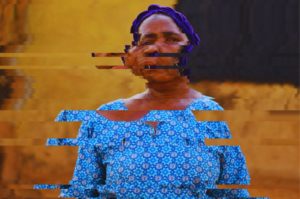My mother always used to say that we lived on the decent part of the street where the houses had larger yards and cars but smaller families. The other side was for those whose social standing meant that they had no choice but to pack themselves and sometimes their extended families into rented rooms in small squalid bungalows.
Opposite us there was one of these unfortunate habitations; painted the exact colour of my favourite bubble gum. Warm rosy pink, its window shutters and doors reminded me of an old woman’s mouth; an odd selection of different colours thrown together like odd shoes.
My father was an architect and believed that the Town Planning people should pull it down and build a decent house. He said it was an eyesore; a boil on the face of humanity and an absolute monstrosity.
My father loved to confuse us with big confusing words.
My mother was a governor at my school, a teacher and lay preacher at the local Anglican Church. She believed that the house’s presence on the street was like the serpent in paradise, a cancerous legacy that lay dormant and if not dealt with might threaten all the decent families and ultimately the whole society.
“I don’t know why we stand for it. We complain and the police promise to deal with it—yet nothing is done.”
I was eight years old then and wondered why she felt so strongly about the house across the road, but I had long learnt that when children asked questions adults did not want to answer they got sent off to their studies.
Our sitting room had large French windows that opened onto the street and let in the noises, the music, laughter that spilled out into the street. I used to spend hours looking out of the window at the pink house and wished I could go inside to see the secrets it held that no adult ever spoke about.
The number of women that lived there varied sometimes. I had counted and given up. Even though I didn’t know their names I knew their faces and I had given them all nicknames. There was the dark plump one I called fatty, and the tall slim one I called the mermaid because she always wore her hair in long plaits. I called one the Jackson girl because of her big Afro like the Jackson’s five on their latest album.
There were always visitors coming and going, lots of cars and loud music. Especially in the evening. I asked my mother why they only had male visitors, and she told me to mind my own business.
I wanted to look like the girls in the house. Their hair would either be pressed straight until it shone or they wore the latest clothes and really cool make up.
Some afternoons they would bring out a radio onto the front veranda and dance to the music. I remember the first time I heard Fela and his Afrobeat. I was ten, and I remember the words very clearly: “If you call am woman, African woman no go gree, she go say, she go say I be lady o.” Then they would sway and jiggle and lose themselves in the drumbeat.
At the peak of the hot season the girls would enjoy the cool shade of the big tree that hung over their veranda, sleeping, plaiting hair or just talking. I did catch a couple of them crying one day, and I was surprised because they were all so beautiful and had so many friends.
One early evening, mother ran out of salt and she asked me to go down the road to Mama George who sold everything from buttons to Kerosene and get some. I saw the Mermaid getting out of a big dark green car driven by an army man. Another man with uniform covered with badges of some sort sat at the back.
She stood in front of the house and watched the car until it disappeared and tears filled her eyes. I asked what was wrong.
“I’m sure your mother wouldn’t want you talking to me.” The large gold hoops in her ears fascinated me. So did her tears.
“My mother is at home.”
She shook her head. “You wouldn’t understand. You are young.”
“I will be a teenager soon.”
The mermaid’s voice lowered as if she was talking to herself. “He wanted to marry me last week. I would have had a whole house, a car, my own driver and a houseboy to myself. I would have been a big Madam. Now he says he can no longer marry me because his Mrs will not allow him to take another wife. I don’t even know if the bastard will come to see me anymore.”
I wanted to ask her what a bastard was but decided not to. “How can he marry you if he already has a wife?”
She glared at me as if she was seeing me for the first time and hissed. “Just go away you silly girl!”
I remembered that my mother had spat on the red sand in front of our veranda before I left and told me to be back before it dried—so I sprinted off to the shop.
The next and last person I saw cry in that house was the Jackson girl.
My parents had gone to a party. My aunt was looking after baby brother upstairs, so I had the freedom to sit on our veranda and enjoy the slightly cooler early evening air.
Several cars were parked outside the pink house, and people were coming and going as usual. James Brown blared from the loudspeakers, and the women were buying peppered chicken, soft drinks and beer from the street traders that set up their wares every night.
I saw a car draw up. Three people got out and walked towards the house. A man and a woman of about my parents age in traditional clothes and a younger man wearing a shirt and trousers. They had to be visitors because I had never seen them before.
The young man knocked on the big red door. One of the women came to open the door, and the visitors pushed past her and went in. Then I heard shouting and screams. Some of the men in the place rushed out, got into their cars and drove off.
One was putting on his trousers.
I saw the Jackson girl run out of the house onto the street screaming, pursued by the younger man who was carrying a big stick.
A woman stood outside the house shouting. “Prostitutes! You lot have corrupted my child. She was a good girl before she came to Lagos! If the police don’t come and shut this den of iniquity down I will burn it to the ground myself! This place is worse than Sodom and Gomorrah!”
There was a crowd of petty traders, self righteous housewives and jobless youths forming in front of the house. The more educated peered through their curtains and shook their heads.
I could sense this was going to be better than TV.
The older man was holding the younger man with the stick and preventing him going to Miss Jackson who stood at a safe distance, hands folded across her chest.
“Let me alone old man!” The young man cried, “I paid bride price on her head and a week after the engagement she runs to Lagos to sell herself. What about the money I paid for her to learn dressmaking. What about the money I gave your family for her dowry eh?”
“I am sorry. Please see my white hairs on my head and pity me. I’m not too proud to kneel before you. You are like my son…forgive her and take her back.”
“Forgive? How can you expect me to take back a woman that has probably slept with half of Lagos? Everyone back home is laughing at me already. Do you think my family can survive any further shame?”
The crowd cheered and supported him.
“Yes Sir. Get your money back from the wicked girl!” someone yelled.
“Such a disgrace to her family!” a woman cried.
“She deserves to be stripped naked and made to walk down the street” suggested one man hopefully.
“Burn the evil place down!” A housewife shouted rallying the crowd.
Miss Jackson had stopped crying and started laughing.” Hypocrites!—if you were looking after your men do you think they would be coming to us.” The crowd quietened and seeing that she had caught their attention she became bolder. “As for him ….” She pointed to the young man. “I came to Lagos after I found out he was sleeping with my best friend. I said to myself he likes her because she has pressed her hair, speaks better English and wears nice clothes. I deserve better than a liar who would betray me with such a woman. At least now I get paid for it.” She jeered and hissed at him.
Just as I thought the young man was going to chase after her again I felt a sharp slap on my shoulder.
I turned round to see my aunt standing in front of me with her arms crossed.
“Get inside. NOW! If your mother…” She pulled me inside and sent me off to bed. I was annoyed at missing the rest of what had happened and when she came up a long time later to check on us I had a question. “What does prostitute mean?”
“Go to sleep.”
“So what happened outside?” I could not see her face because the light was dim.
Her voice had a hint of finality. “The police came but they were too late. Now go to bed.”
The next morning I woke up and saw that the Pink House had been boarded up and the girls were sitting outside with their suitcases and bags. Some were crying.
“Why are they going?”
My mother’s eyes were red. Her voice heavy. “It’s a sad story. Apparently one of the girls died last night. Her fiancée came to get her and when she refused to go back with him —he had a knife and he …..” Mother stopped and then shook her head. “You ask too many questions! Get up and go and take a bath!”
I had my bath in a daze, trying to understand what I had heard and seen the night before and afterwards – for the first time in my young life—I refused breakfast.
Soon neighbours said that at night they kept seeing a girl with a huge Afro sitting on the portico plaiting her hair and singing a Fela song. I was scared and made sure that I never ran errands that would take me past the empty house after sundown.
A few months later, they pulled the place down and built a house like ours there. My father was happy that the Town planners had finally come to their senses and done the right thing. All that was needed now was for all the horrible houses on that side of the street to be taken down as well. Then the street would attract good people.
When I got into my teens a few years later, my mother became extra strict and said if she even saw me talking to a boy she would kill me.
“That’s what probably got that girl along that terrible path. Her mother wasn’t strict enough. Well, I won’t make that mistake,” She would tell me as she brandished a cane.
Through the tough years that accompanied growing up I often thought of the girls in the pink house fondly. Sometimes I wondered where the other ones had gone, especially the Mermaid and wondered whether she had got her man, big house along with cook, maid and driver after all.
***********
Post image by Nagarjun Kandukuru via Flickr
About the Author:
 Award winning writers, Ola Awonubi was born in London to Nigerian parents. She received an MA in Creative writing and Imaginative Practice at the University of East London. She is author of Love’s Persuasion. Some of her short stories are feature on africanwriting.com, StoryTime, faithtowrite.com and naijastories.com. Her short story, “Green Eyes and an Old photo,” is in the 2013 African Roar Anthology edited by Ivor Hartman while “Ilusion of Hope” appeared in the NS Publishing short reads series—Wiping Halima’s Tears. She has a romance novel due for publication later this year.
Award winning writers, Ola Awonubi was born in London to Nigerian parents. She received an MA in Creative writing and Imaginative Practice at the University of East London. She is author of Love’s Persuasion. Some of her short stories are feature on africanwriting.com, StoryTime, faithtowrite.com and naijastories.com. Her short story, “Green Eyes and an Old photo,” is in the 2013 African Roar Anthology edited by Ivor Hartman while “Ilusion of Hope” appeared in the NS Publishing short reads series—Wiping Halima’s Tears. She has a romance novel due for publication later this year.
Find more of her work {HERE} and {HERE}
Follower her on Twitter @createandwrite










nhpstudy.com November 03, 2017 03:47
hi!,I love your writing very a lot! percentage we keep up a correspondence extra approximately your post on AOL? I require a specialist in this space to unravel my problem. May be that is you! Taking a look ahead to look you.